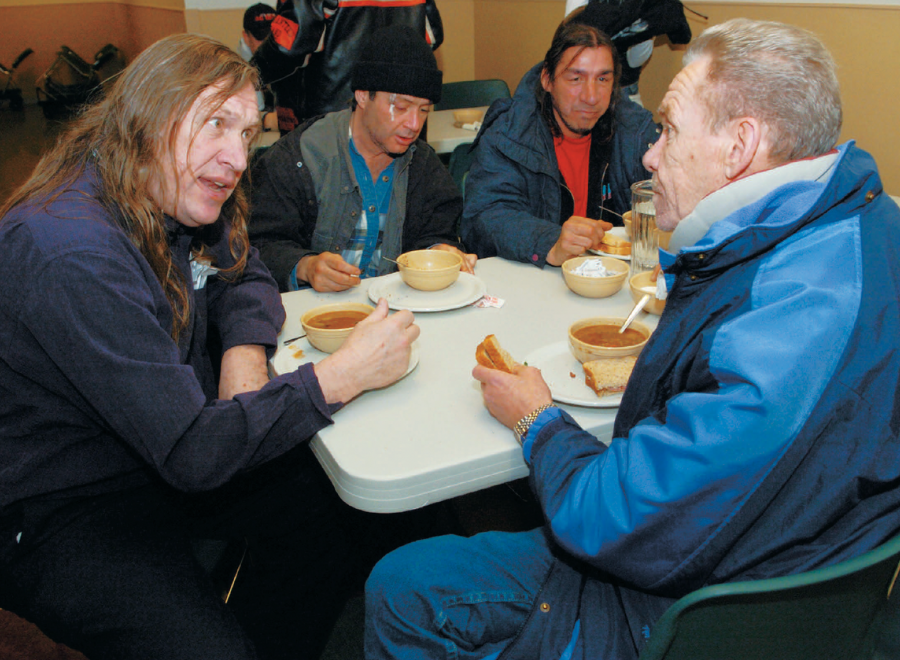A couple dances in a downtown Victoria park. Their sleeping bags and randomly layered clothing signal their homelessness. No music accompanies their strange swaying. Just the euphoric effects of crystal meth.
Lost souls. Terrible waste.
Scenes like this are hard to reconcile with Victoria’s reputation as a bastion of colonial civility. Afternoon tea is still served daily at the Empress Hotel. And 3.5 million tourists come here annually for the city’s mild weather and mild manners.
But Victoria is now home to 1,500 homeless people, a growing drug problem and the petty crime that comes with it. It’s also home to Canada’s second most expensive real estate market, the average price of a single-family home now around $587,000.
As the gap between rich and poor widens, it’s hard to feel anything but despair. But a sea change is upon this Pacific city.
Victoria’s mayor (with provincial support) is taking a “housing first” approach and plans to build or remodel 1,550 new housing units over the next five years. After all, it’s cheaper to house the homeless than to manage them (think policing, jails, hospitals, emergency shelters, clean-up, etc.).
The city’s other secret weapon is Rev. Allen Tysick, a United Church minister who has just opened Our Place, a $14-million facility for Victoria’s homeless and adults in crisis.
“Excellent, excellent — with two exclamation marks,” says one woman who lived on the street but now resides in one of 45 transitional housing units at Our Place. It’s easy to understand her enthusiasm. She went from sleeping in doorways and begging for spare change to having a room of her own with a fresh coat of celery-green paint.
The tide is turning.
WELCOME TO OUR PLACE. Let’s start in the basement. Games room at the bottom of the stairs, furnished with foosball and pool tables. Free clothing depot, laundry facilities, lockers. Showers and bathrooms.
Now the main floor. Reception desk. Sliding security doors opening onto a large drop-in centre (tables, chairs, more washrooms). Computer room to your right decorated with stained glass made by Allen Tysick.
Up to the second floor. Kitchen and large dining hall. Meeting room/chapel and offices. More washrooms.
Floors three to five. Forty-five private bedrooms, each with a new bed, new linens, a flat screen TV and a private three-piece bathroom. Shared laundry room, lounge and balcony.
And everywhere you go, huge windows flooding the place with glorious sunshine. Some call it the Hobo Hilton. I wish my university residence had been this nice.
Our Place is the love child of the Open Door, a United Church drop-in centre since 1986, and The Upper Room, an interdenominational Christian centre providing housing and meals since 1967.
In 2006, they joined forces and raised $14 million from governments, churches and individuals — all without ever launching an official fundraising campaign. The result was the new facility, complete with transitional housing, meals and counselling.
Wouldn’t the $14 million have stretched a little further if the building hadn’t been so, well, nice?
“They deserve the best,” Tysick says. “They don’t deserve our leftovers. That’s what they usually get. Our leftover socks, underwear, our leftover food. We’re the first people to give them a brand new room. For you — for you,” he repeats with a finger jab, suddenly speaking to an imagined client. “Because you damn well deserve it. And if I’m going to ask you to get out of that milieu, then I’ve got to build you a structure where you feel worthy.”
“MIND IF WE INTERRUPT?” Allen Tysick and his assistant are having a lunch meeting in his office. It’s our second day here, and I have just a few more questions. He quickly finishes up, invites us in, tells us he has as much time as we need. The man who finds homes for the homeless is accommodating in more ways than one.
On this day though, “Rev. Al” is discouraged. The provincial budget, announced the day before, has not made homelessness a priority.
“The environment took the money,” he says. “Homelessness got a mention. I had hoped that the energy would carry it over to where the rubber hits the road. And that’s the budget. I’m frightened that across the country that’s going to be the case.”
We chat some more and I get the impression that he’s learned the hard way that things don’t get done unless you pursue them with single-minded determination. You don’t rest on your laurels or waste time patting yourself on the back. I point out the positive things happening in the city — Our Place has just opened, and the mayor’s “housing first” approach. Tysick rides the wave of optimism for a moment, but doesn’t coast there long.
He thinks about the work ahead — like meeting his operating budget and finding enough money to keep the Our Place drop-in centre open 12 hours a day, seven days a week (rather than eight hours on five days).
“I’m always optimistic. Certainly there is a wind of change about us. But if you don’t watch, that wind could become a fart pretty quick. I’m asking the church for a holy rage around poverty. So they’ll push that wind forward.”
“I’M IRISH-CREE,” says Don Clinton Cook with a twinkle. “I never give up.”
In his new room at Our Place with the new tiger bedspread, Cook — or “Cookie” as he’s known — spins yarn after yarn, his tales leaping through time and space, from the plausible to the implausible, each one starting before the last one ends, some of them pausing for a moment to drop in his favourite punchline, “I’m Irish-Cree . . .”
So, in honour of Cookie, here’s to not letting black-and-white facts get in the way of a colourful story. This is how he tells it.
He was born in Victoria. At age two, he was pushed off a tricycle resulting in a leg injury that never fully healed. He made it through school up to Grade 8, but he’s a self-taught man. He married four times and has 22 children, half of them adopted. He worked his way up in the world, owned a restaurant, a trucking business and a yachting company.
Eventually, he became a multimillionaire. Then, his brother took a yacht full of drugs through the Panama Canal, got caught and lost it all. His son, then 19, murdered a woman and was sentenced to life in an American prison. That’s when he hit the bottle — “really hard.” Cookie fell down a flight of stairs, further damaging his bad leg. He can’t get low-cost housing because people discriminate against Indigenous Peoples and the disabled. He wound up on the street, drinking his “barley soup” and sleeping in a yellow boat behind a municipal office.
He has good days and bad days, but, being Irish-Cree, he doesn’t give up.
Now 67, Cookie has been living at Our Place for a month. Asked what he wants for himself, Cookie turns grandfatherly and thinks of others — the young Indigenous Peoples on the streets who are hooked on drugs and alcohol, his son who will soon be released from prison. “I want to help everyone as much as I can,” he says. “People tell me, ‘Nobody loves me.’ Just don’t ignore them. A smile doesn’t cost nothing.”
GERALD WEPT. Throughout our interview, he wept for the child he once was. For the adult he’s become. For friends and family dead, sick or living on the streets. For the beautiful room he’s been given and the chance to change his life.
We meet Gerald Amos, 42, in the lobby at Our Place. He strikes up a conversation. Wants his picture taken. Too quickly shares his most intimate thoughts. Too loudly bares his soul.
A nearby staff member sharply tells Gerald to turn down the volume. We get permission to move upstairs to the room he’s been living in for a week.
“You don’t know what it’s like to have your own room. When you’ve got your little space, you’ve got your pride, eh?”
His pride goes beyond words. When we walk into the room, he quickly tidies up a few stray socks on the floor. Cleaning supplies sit on the bathroom vanity. On the desk is a nail care set, still in its package. A First Nations art calendar hangs on his wall. His nephew is one of the artists.
Until a few months ago, Gerald was working at a 7/11 and at a fish and chips stand. “I went through depression. I went through stuff I haven’t dealt with in a long time. My brother was murdered. It caught up to me and took me all the way down,” he says.
After two weeks in rehab for alcoholism, Gerald moved into Our Place. His goal is to get back into the workforce. “I’m pursuing something in retail or administration,” he says earnestly. But his heart is still on the street and he checks up on his street friends daily.
“You don’t want to see your friends out there. Your friends are frikkin’ cold, sleeping on sidewalks. And I’m inside. It makes me feel bad they’re still out there.”
LUNCH IS OVER AT OUR PLACE, and Jill Cater, 47, sips a cup of tea in the still-crowded dining room. A fast talker with a quick smile, Jill seems too with-it to be hanging around a homeless shelter.
Two and a half years ago, Jill arrived in Victoria, homeless for the first time. She weighed 95 pounds, could barely speak, couldn’t concentrate, didn’t want anyone near her. Though she’s never been diagnosed, she believes she was suffering from post-traumatic stress disorder.
Several life-altering events had converged, propelling her toward life on the streets. First, she was laid off from her job at a nursing home. Then, she heard that the man who had murdered her son years ago was about to be released from prison. Finally, an addict she had once tried to help broke into her home and attacked her, kicking her in the head repeatedly.
Her employment insurance ran out and she was evicted from her apartment. The first night, she slept in an archway near her apartment building. Someone loaned her enough money to take the ferry to Victoria. When she arrived, she stayed with a friend for a month, then at a women’s shelter.
“When you’re in a shelter, you’re kicked out during the day. You have to carry your home on your back. You have to line up for a bed at night, and there’s no guarantee you’ll get one. People treat you like you’re the scum beneath their feet. People spit on you. I thought I knew what it was like to be homeless. But you don’t know until you’re there.”
These days, life is turning around for Jill. She receives a monthly disability cheque. She has a one-bedroom apartment and volunteers as an office assistant for a harm reduction group on sexually transmitted diseases. Her poetry has been published in a book and written onto a quilt.
Jill has a past, but she also has a future. “I’m thinking now I’d like to do outreach. I want to use all my negative experiences for something good.”
***
This story first appeared in The United Church Observer’s May 2008 issue with the title “Street survivors: building hope for Victoria’s homeless.”















